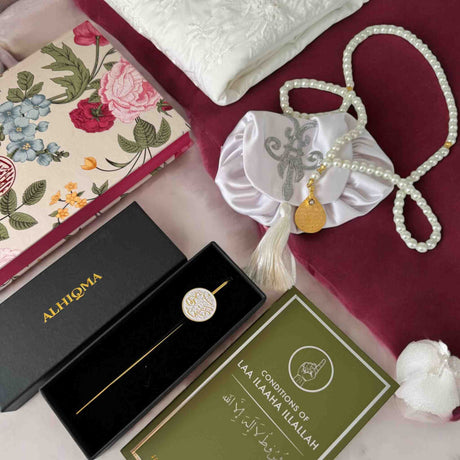Key Takeaways:
-
Targeted Supplications: Invoking specific names of Allah allows you to tailor your duas to your particular needs, concerns, and desires, fostering a more focused and personal connection with the Divine.
-
Deeper Understanding of Allah's Attributes: Understanding the meanings behind each name expands your comprehension of Allah's boundless qualities and how they manifest in your life and the world around you.
-
Spiritual Growth and Reflection: Engaging with Asma'ul Husna encourages introspection and reflection on your relationship with Allah, leading to personal growth and spiritual enrichment.
Invoking Allah's names in your duas can help you connect with Him on a deeper level and guide your supplications more effectively. Let's explore how you can use the names Al-'Alim, Al-Qabid, Al-Basit, Al-Khafid, Ar-Rafi', Al-Mu'izz, Al-Mudhill, As-Sami', Al-Basir, Al-Hakam, Al-'Adl, Al-Latif, Al-Khabir, Al-Halim, Al-Azim, Al-Ghafur, Ash-Shakur, and Al-Aliyy in your prayers:
-
Al-'Alim (The All-Knowing):
- Invoke Allah's name to seek His knowledge and guidance in your life.
- Example dua: "Ya Al-'Alim, You know everything that is in my heart and mind. Grant me wisdom and guidance to navigate my life according to Your will. Ameen."
-
Al-Qabid (The Withholder):
- Call upon Allah's ability to withhold when you seek His protection and relief in times of hardship.
- Example dua: "Ya Al-Qabid, protect me from harm and evil. Withhold calamities and difficulties from my life and grant me safety. Ameen."
-
Al-Basit (The Expander):
- Use this name when asking for Allah to expand your blessings and opportunities.
- Example dua: "Ya Al-Basit, expand my provision and grant me abundance in my life. Increase my opportunities and guide me to use them wisely. Ameen."
-
Al-Khafid (The Abaser):
- Invoke this name to ask for humility and protection from arrogance.
- Example dua: "Ya Al-Khafid, keep me humble and protect me from arrogance. Help me remember that everything comes from You. Ameen."
-
Ar-Rafi' (The Exalter):
- Use this name when seeking Allah's favor and exaltation.
- Example dua: "Ya Ar-Rafi', elevate me in rank and status. Grant me success in my endeavors and bless me with Your favor. Ameen."
-
Al-Mu'izz (The Honourer):
- Call upon Allah's name when asking for honor and respect in your life.
- Example dua: "Ya Al-Mu'izz, grant me honor and respect in my relationships and actions. Help me to honor others as well. Ameen."
-
Al-Mudhill (The Dishonourer):
- Invoke Allah's name to seek protection from humiliation and disgrace.
- Example dua: "Ya Al-Mudhill, protect me from humiliation and disgrace. Guide me to live a life that honors You and avoid shame. Ameen."
-
As-Sami' (The All-Hearing):
- Use this name when asking Allah to hear your prayers and supplications.
- Example dua: "Ya As-Sami', hear my prayers and respond to my supplications. Guide me in my words and actions. Ameen."
-
Al-Basir (The All-Seeing):
- Invoke Allah's name when seeking His guidance in observing and understanding the world around you.
- Example dua: "Ya Al-Basir, grant me clarity of vision and understanding. Help me see the world through Your guidance and wisdom. Ameen."
-
Al-Hakam (The Judge):
- Call upon Allah's judgment when seeking His guidance in making decisions.
- Example dua: "Ya Al-Hakam, guide me in my decisions and actions. Help me discern what is right and just. Ameen."
-
Al-'Adl (The Just):
- Invoke Allah's justice when seeking fairness and balance in your life.
- Example dua: "Ya Al-'Adl, guide me to act with fairness and justice. Help me treat others with equity and honor. Ameen."
-
Al-Latif (The Most Subtle):
- Call upon Allah's subtlety when asking for His gentle guidance and intervention.
- Example dua: "Ya Al-Latif, guide me gently and help me navigate my life with Your subtle wisdom. Grant me Your grace and blessings. Ameen."
-
Al-Khabir (The All-Aware):
- Invoke Allah's awareness when seeking His knowledge of your circumstances and guidance.
- Example dua: "Ya Al-Khabir, You know everything about me and my life. Guide me with Your knowledge and help me make the right choices. Ameen."
-
Al-Halim (The Most Forbearing):
- Use this name when asking for Allah's patience and forbearance in your life.
- Example dua: "Ya Al-Halim, grant me patience and forbearance in my trials. Help me respond with calmness and wisdom. Ameen."
-
Al-Azim (The Magnificent):
- Invoke Allah's magnificence when seeking His awe and majesty in your life.
- Example dua: "Ya Al-Azim, You are the Most Magnificent. Guide me to appreciate Your greatness and live in awe of Your creation. Ameen."
-
Al-Ghafur (The Oft-Forgiving):
- Call upon Allah's forgiveness when seeking pardon for your sins and shortcomings.
- Example dua: "Ya Al-Ghafur, forgive my sins and shortcomings. Grant me mercy and help me to forgive others as well. Ameen."
-
Ash-Shakur (The Most Appreciative):
- Invoke Allah's appreciation when seeking gratitude and blessings in your life.
- Example dua: "Ya Ash-Shakur, grant me gratitude for Your blessings. Help me to appreciate Your gifts and share them with others. Ameen."
-
Al-Aliyy (The Most High):
- Use this name when asking for Allah's guidance and elevation in your endeavors.
- Example dua: "Ya Al-Aliyy, elevate me in my pursuits and grant me success. Help me to walk the path of righteousness and honor Your will. Ameen."
By incorporating these names of Allah into your duas, you can focus your prayers on specific attributes of Allah and seek His guidance and blessings in various aspects of your life. May your prayers bring you closer to Allah and grant you the blessings you seek. Ameen.
Enhance your understanding and appreciation of the 99 Names of Allah with our curated collection of Islamic resources. From books and flashcards to decorative wall art, we offer a variety of tools to enrich your spiritual journey.
Embark on a journey of deeper spiritual understanding by exploring our comprehensive series on the 99 Names of Allah.
Frequently Asked Questions:
Q: How can I incorporate Asma'ul Husna into my daily life beyond prayers?
A: You can contemplate their meanings throughout your day, seek to embody the positive qualities they represent, or even use them as inspiration for personal growth and self-improvement.
Q: Are there any specific times when certain names are more appropriate to use?
A: While there are no strict rules, certain names may resonate more deeply depending on your circumstances. For example, you might invoke Al-Shaafi (The Healer) when seeking healing or Al-Razzaq (The Provider) when needing sustenance.
Q: Is it necessary to know the Arabic pronunciation perfectly to use these names?
A: While striving for correct pronunciation is commendable, the sincerity of your intention is most important. You can use transliterations or your own language if needed.
Q: Can I combine multiple names of Allah in a single dua?
A: Absolutely! You can combine multiple names in a single supplication to express various needs and requests.
Q: Where can I find a comprehensive list of all 99 Names of Allah and their meanings?
A: Many resources, both online and in print, offer detailed explanations of each name. Consider exploring Islamic books, websites, or apps dedicated to Asma'ul Husna.












